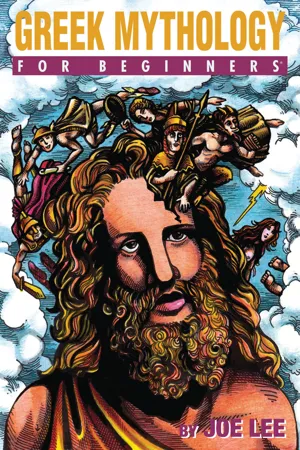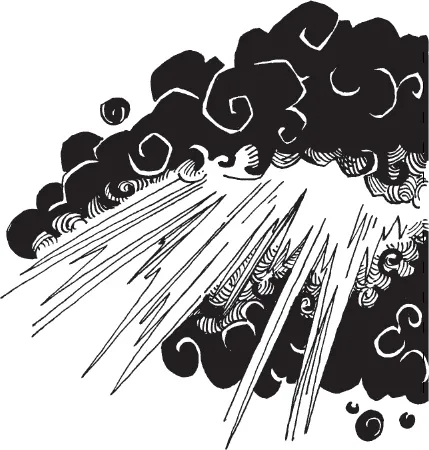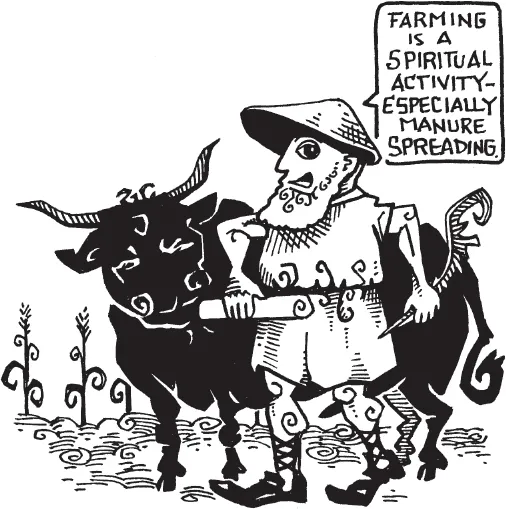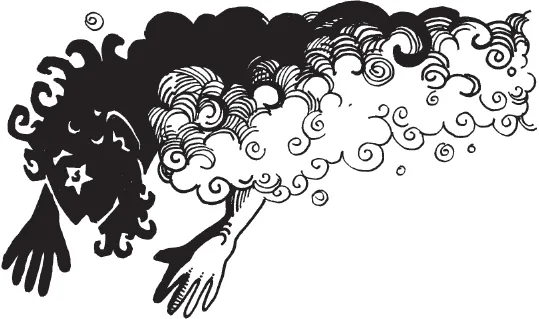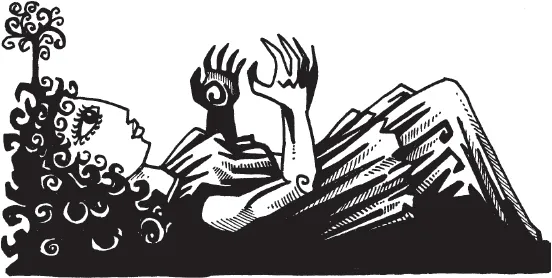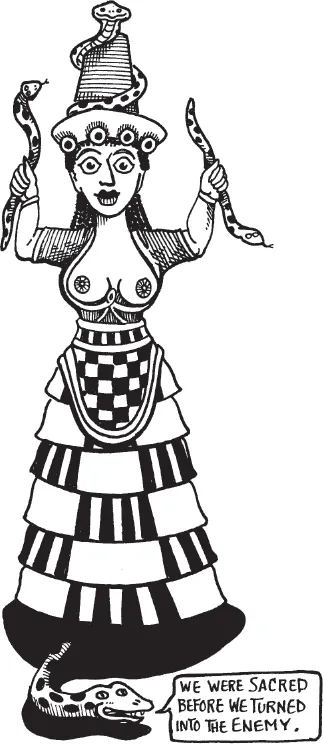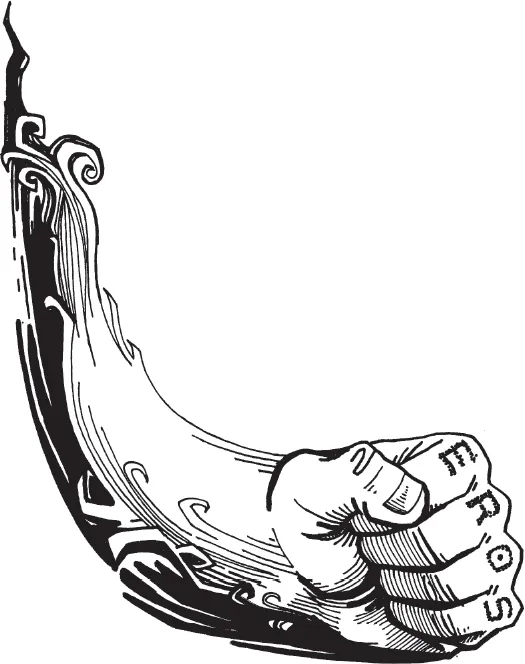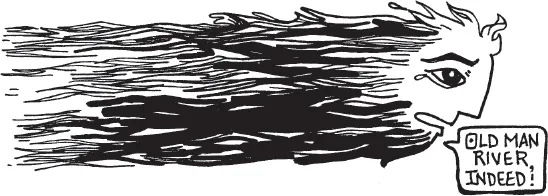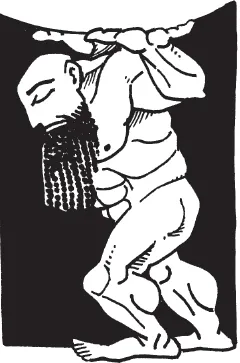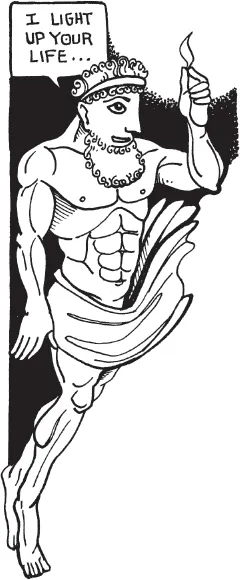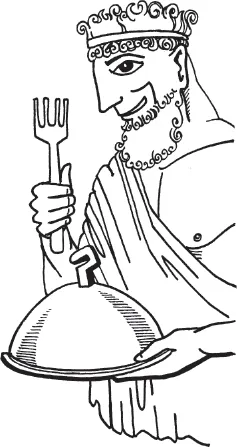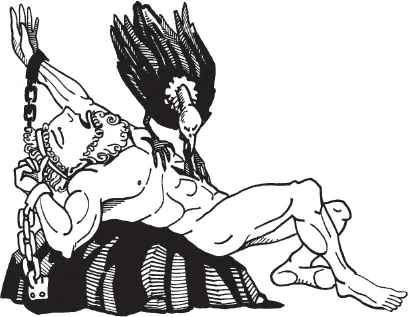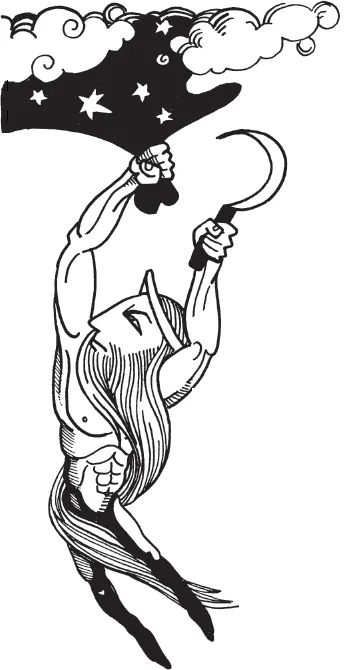![]()
PART I.
THE GODS THEMSELVES, FROM CHAOS TO CHRISTMAS
1. CHAOS
In the beginning—because from the Bible to Steven Hawking we humans have always pondered the origin of our universe and endlessly and often poetically theorize about it—was Chaos. Chaos was the dark and roiling stuff, or “non-stuff,” that represents the original condition. It was the undifferentiated mass from which all things are formed. The fusion of all the elements. The potential from which all arises. The singularity. But Chaos is also the opening of that original condition, the splitting asunder of that crowded and pregnant nothingness. The Big Bang, if you will.
Chaos did breach, and from that cosmic gate came first Tartarus—the lightless depths of the universe that lie below and precede Hades—and Erebus, the darkness from which all darkness descends, the primeval shadow that blots out even the thinnest flicker of flame. And from Erebus in yet another grand and exquisite parthenogenetic display came Day—for we will ever beg for the darkness to become light. Then Erebus continued by impregnating Day (assuredly a feminine attribute of nature, and at this point we can naught but assume Erebus represents the masculine side of the coin) and fathered the Sky.
So it began, according to that early chronicler, Hesiod, in his great poetic work Theogony written some 800 years after the time of Homer. Hesiod was not only a poet, but like our own Wendell Berry, a farmer, and his poem is much more than just a riotous epic of the origin of our own little piece of the cosmos. It is very much a religious work, and as we delve even deeper into these divine and dirty tales, it is always important to remember that these were not fairy stories to entertain and sometimes enlighten, but they are the stuff of human belief. The Greeks’ very foundation of spiritual interaction with the world they found themselves in. They worshipped, prayed, and sacrificed to these gods. In their ancient equivalents of foxholes, they found comfort in invoking their names and begged their indulgence in times of distress.
2. OURANOS AND GAEA
Concurrent with the split in Chaos and preceding the twinned darknesses, another player pushed through into the brand spanking new realm of existence. Thus began Gaea the earth, our own dear original mother and mother of all the varied and wondrous creatures and all the elements, mountain, forest, stream, and sea, that make up physical existence as we know it. And she was mother to Ouranos, aka Uranus, the sky. And in true masculine fashion, Ouranos overwhelmed and subjugated his mother, the great feminine principal and principle, to his own bidding, coupled with her and gave birth to the first race of divinities—the Titans.
Of course, and so early in our travels, one can not fail to notice that the deities are not only forces of nature but also beings that seem to engage in the same activities we mere mortals do. They have sex. They give birth. They fight, make up, or bear eternal grudges. Are they “people” or are they “natural states?” The only answer that one can give is that they are two things in one. Let the mystery of the human mind do its typical job of allowing us to hold opposite and mutually exclusive thoughts and views firmly in place without causing our head to explode.
One might also notice that within the space of several pages two different origins of the Sky have been given: Erebus and Day are the parents of Sky and Gaea gives birth to the Sky, Ouranos, without benefit of a sire. There in the dim and murky reaches wherein our universe was born things get a bit confused, and as these stories were not written down until they had been told and retold for thousands of years, they certainly vary with the teller. Like the ancient Hebrews, things that are “irrefutable truth” on one page then become quite another “irrefutable truth” several pages on. Just read our Bible's Genesis Chapters 1 and 2 and try to resolve exactly when humans were created—was it before or after the animals? Best to “judge not.”
Gaea, our mama, our soil, the solid ground beneath our feet is often represented by the creatures that are most firmly in contact with her—snakes. One sees the survival of her cult in the statues of her acolytes handling those long and subtle reptiles that have engendered so much interest and fear through the ages. In ancient Crete, an island some 200 or so miles south of Athens in the Mediterranean Sea, the Minoan civilization seemed to value the power of this connection and created many representations of snake priestesses, or possibly goddesses in their own right, using snakes in their worship. Humans’ seemingly universal aversion to snakes would appear to be some sort of rejection of this most primordial deity, but as we shall see, Gaea's direct offspring became some of the fiercest enemies of the future Olympians.
The history of our own little planet truly begins with Gaea and her son/consort Ouranos having their babies, and what babies those Titans turn out to be! Before we move too quickly past those oldest of times, we must speak of that greatest motivational energy in the universe.
3. EROS
Eros also found its way out through that terrible rending of Chaos at the beginning of time. Eros was not some overfed toddler armed with a toy bow and nonlethal arrows; no, that Eros would come much later and be overwhelmed by the tantalizing Aphrodite. This Eros, the original Eros, was a force of nature, a force that neither god nor man could stand against. At one time or another all creation could find itself in the passion of its irresistible embrace. This was not a “face that launched a thousand ships,” but the force directed within the soul that could gaze upon that face and lead nations into war and devastation and the unreason that justifies such endeavors. This Eros seems not to have been personified but remained ever the energy that could set to motion all the doings both great and small that occurred outside the basics of eating, drinking, and breathing. No wonder that in terror of such power humans would try to domesticate it with diapers and silver wings.
4. THE TITANS, THE CHILDREN OF HEAVEN AND EARTH
OCEANUS. One of the first offspring of Ouranos and Gaea was Oceanus. We have earth and sky, so we had better fill in the rest of this world project with a little water. Oceanus is the great circling stream that encloses the landmass of the world and the source of all the rivers that flow through it. Not much is said of Oceanus other than that he is personified as “he,” not only by the ending of his name but by his marriage to his sister Tethys and the fathering of the Oceanids, those nymphs who inhabited this great world river. Of course, we must remember that according to ancient Greek cosmology, the realm of Oceanus was also the place from which the sun, moon, and stars ascended and made their clockwork descent and the vast watery plate upon which Gaea floated. Sometimes just being there is quite enough.
ATLAS. This Titan we remember not so much for his importance in the pantheon but for the punishment inflicted upon him. He was a grandchild of Ouranos and Gaea, son of their children Iapetus and Clymene, and brother to the uber-important Titan, Prometheus. Atlas, of course, is the Titan with the big shoulders and a job to match. In one telling he ran afoul of Zeus, who was at the time solidifying his power against his forbears, and Atlas took the side of his siblings and cousins. And it is never a good thing to choose the losing side. In another version of the story, he has been demoted to the position of an earthly king with a penchant for gardening (the gardens at the very end of the earth—the Hesperides), and in his fabled garden grows a tree with the most wonderful fruit—golden apples (a fruit which might keep the doctor away but certainly cannot keep gods and humans out of trouble). Perseus, fresh from giving Medusa a much-too-close haircut has heard tell of this delectable delicacy and would like to sample a piece. “No!” says Atlas, at which point Perseus gives him a glimpse of the Gorgon's still petrifying eyes, and in an instant, Atlas shrugs his mighty shoulders up from earth to the very edge of the sky. Growing larger still he becomes the mountain that becomes the heaven's rooted support.
PROMETHEUS. If you were to know any of the Titans it would probably be Prometheus. He was a darling of the Romantic poets, a favored metaphor of Enlightenment intellectuals, an arousing model of art deco sculptors. He is also credited in some accounts with the creation of humans, so he will always rank high with members of that particular species. The story goes that Prometheus and his brother Epimetheus, as two Titans who had sided with Zeus in his war with those earlier gods (yes, there will be war), were given the pleasant task of forming all the creations that would inhabit the lonely earth. Prometheus delegated his tasks to his brother, who set out with gusto. Gathering, sculpting, and attributing all the strengths to all the various animals was a work of creative joy for Epimetheus until he got to his last creation—humans. By that time he had used all the wings and feathers, fur and claws, and strength and endurance on all the other creatures. Humans were left hairless, vulnerable, and terribly unappealing. Prometheus, whose name, after all, means “foresight,” was not surprised at his brother's failure and stepped in to finish the job. He raised humans upright on two feet to walk like the gods, gave them cunning and intelligence to think like the gods, and—what else could he gift these pathetic creatures with to give them an advantage? Fire most certainly would do the trick! And Prometheus promptly stole flame from the heavens and taught humanity not only its many uses but also how to make it. Naughty god!
Zeus was none too pleased at this state of affairs and wanted some sort of reckoning with the Titan. Our dear Prometheus, even in this precarious position with El Supremo, ever the trickster (and always the trickster must trick even when putting himself deeper and deeper in the doo-doo), devised a contest, a taste test of sorts, and none other than Zeus would be the judge. Prometheus took a cow and separated it into its constituent parts—hide, bones, meat, fat, and stomach. Then he wrapped the fat around the bones and covered it with the cowhide. Voila! A cow is born, or, at least, the shape of a cow is born. Prometheus then stuffed the juicy meat inside the stomach creating an early Greek version of haggis. Now it was time for Zeus to select the cut of his choice. No brainer. Zeus chose the plump cowhide with what seemed to be its nutritious and delicious contents and Prometheus presented the “loser” to the lowly humans. With increasing anger and disgust, Zeus unwrapped his prize and even if he could have taken a bite of the oozing gelatinous mess, his fury with Prometheus would have spoiled his dinner. The Titan feasted with the recipients of his largesse and burped his praise to the god-all father.
As if this was not enough to completely sever any smidgeon of goodwill Zeus might have remaining for Prometheus, Prometheus still could not help himself. He had a secret, and it was one that could potentially rend the heavens. A beautiful Nereid named Thetis had caught both the eye of Zeus and his brother Poseidon. Neither god was particularly subtle in their wooing, but neither was quick about consummating either. Mr. Foreseeing knew exactly the problem that the lords of sea and sky were intuiting—it was fated that whoever had a son by Thetis would be destroyed by that son. Rather than spoil the result and settle the unease of the gods, Prometheus thought a little knowledge might provide a whole heap of insurance, but his calculations were wrong. Zeus hauled him to mountains of the Caucasus and had him chained to a rock. Every day a vulture dispatched by you-know-who picked away at Prometheus's liver. Every night the injured organ would grow back. How our great benefactor suffered. Just when it seemed it would never end, along came Heracles, he of the bulging muscles and a not inconsiderable intelligence. He bargained with Prometheus to break his chains in exchange for a little immortality-mortality switch-up with Chiron, the centaur. It seems somewhere along the way Prometheus had lost his immortality and Chiron, suffering with incredible pain, had gained the deathless condition without the reward. In the end, the horseman could die in peace and the Titan could live free again and forever. Prometheus unbound!
CRONOS. Old Father Time himself was young once and like so many young sons, the enemy of his father. Why couldn't they just get along? Ouranos was a jealous and tyrannical ruler of the heavens and the earth, his wife. Whenever she gave birth, Ouranos buried the child deep in the belly of his mother—from womb to tomb was a very short trip, and to those Titans, a familiar locale. But Cronos would have none of it. He with the help of his mother clawed his way back to the light and on his emergence, his rebirth, was presented with a sickle—a potent tool from Mother Earth and a terrible weapon in the hands of a Titan. Armed and ready for a scrape, he attacked his old man. A war in heaven! Time proved the victor, and the price rung from his father was great. Ouranos's blood dripped from the skies and spawned monsters when it fertilized the fecund soil below. Giants burst up from the vicious sperm and they were joined by their sisters, the Erinyes, the Furies, those shrieking avengers of familial crime. But Cronos's revenge was not complete; he would make his cruel father sire no more and with a slice of his blade severed Ouranos's testicles from his body and flung them into the churning sea below. They sank to the bottom not qui...
